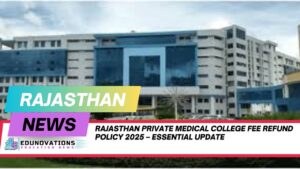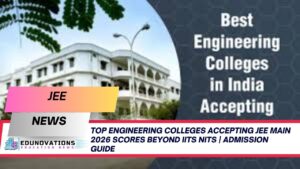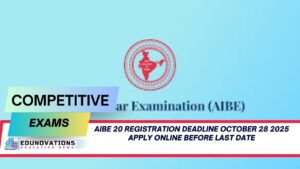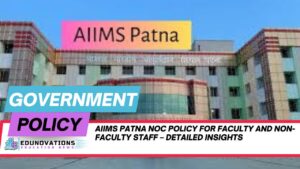Discover the latest UPSC age limit reform 2025 news. Experts propose reducing age and attempts, inviting mid-career professionals into civil services.
The Indian civil services examination conducted by the Union Public Service Commission (UPSC) has long been considered the pinnacle of competitive exams in the country. However, in light of evolving career landscapes and national demands, a renewed push for transformation is making headlines. The UPSC age limit reform 2025 news has gained serious traction after former Reserve Bank of India (RBI) Governor Dr. Duvvuri Subbarao proposed sweeping changes to the existing civil service entry framework.
In a strong appeal, Dr. Subbarao suggested a drastic overhaul of the age and attempt limits for the UPSC Civil Services Exam (CSE), advocating for inclusion of professionals aged 40 and above. His suggestions have triggered widespread debate among aspirants, bureaucrats, and educational institutions alike.
Let’s unpack these recommendations, their rationale, implications, and what this could mean for the future of India’s bureaucracy.
The Heart of the Reform Proposal
At a panel discussion hosted by the Centre for Policy Research (CPR), Dr. Subbarao, known for his insightful views on public administration and economic governance, argued that the current civil services entry model needs an urgent rethink.
Key proposals from the former RBI Governor included:
- Reducing the maximum age limit to take the UPSC exam.
- Limiting the number of attempts to ensure only serious candidates continue.
- Allowing mid-career professionals (especially in the 40+ age group) to join the Indian Administrative Services (IAS) through lateral entry or special exams.
These suggestions are reshaping the public conversation on India’s bureaucratic machinery and sparking a wider examination of inclusivity and efficiency in civil services.
What’s Driving the Call for Reform?
India’s civil services are hailed for their prestige, but critics argue they lag in attracting domain experts who can help manage increasingly complex governance challenges. Dr. Subbarao’s suggestion ties into a broader strategy: attracting talent from outside the traditional academic and coaching center circuit.
The world’s largest democracy is facing a governance paradox — there’s a rising need for specialized knowledge and technical expertise, but recruitment remains rooted in a decades-old pattern favoring rote learning and generalists.
This is where the mid-career IAS entry for professionals comes in. Bringing in sectoral experts in finance, technology, education, or climate change, even if they are over 40, can vastly improve administrative efficiency.
Why Focus on Age and Attempts?
The UPSC age limit reform 2025 news has sparked an intense nationwide dialogue, particularly around the feasibility and fairness of the current civil services eligibility framework. One of the key drivers behind this debate is the unusually high upper age limit and number of permitted attempts for aspirants in India.
Currently, candidates from the general category can appear for the UPSC Civil Services Examination until the age of 32, with a total of six attempts. OBC and SC/ST candidates enjoy even more leniency — with age limits extended to 35 and 37 years respectively, and attempts ranging from 9 to unlimited. While this system is often praised for being inclusive, it also leads to prolonged preparation cycles, psychological pressure, and the risk of career stagnation.
According to the UPSC age limit reform 2025 news, former RBI Governor Dr. Duvvuri Subbarao strongly recommends a revision of both age and attempt limits. His UPSC exam attempts limit proposal emphasizes the need to:
- Shorten the preparation window, pushing aspirants to start early and strategize better.
- Promote timely decision-making, helping candidates transition to alternative careers if needed.
- Prevent psychological exhaustion and financial distress, often experienced by those preparing for 5–8 years with no success.
This approach, as highlighted in the UPSC age limit reform 2025 news, is more aligned with global administrative systems, where age limits are tighter and exams are conducted with a more performance-oriented structure. For instance, in countries like the UK and USA, civil service recruitment is swift and merit-driven, reducing long-term uncertainty and ensuring better career planning for individuals.
Support and Opposition: A Growing Divide
While the UPSC age limit reform 2025 news has received support from policymakers, educators, and administrative thinkers, it has also been met with resistance. Critics argue that changes in age and attempts could disproportionately impact aspirants from rural areas, economically weaker backgrounds, and marginalized communities.
Key concerns raised include:
- Late academic exposure: Many candidates from Tier 2 and Tier 3 towns begin serious preparation only after completing postgraduate studies or securing financial stability.
- Time-intensive preparation: Without access to proper coaching, mentorship, or digital resources, aspirants often take multiple years to even grasp the UPSC syllabus.
- Lack of institutional support: For those outside major cities, the UPSC journey is a solitary one, with fewer opportunities for academic or professional backup plans.
Yet, the UPSC age limit reform 2025 news also brings hope for a balanced reform structure. Proponents of the civil services exam eligibility changes suggest that compensatory measures can ensure inclusivity while modernizing the exam process.
Some of these suggested reforms include:
- Enhanced mentorship programs through government-sponsored platforms.
- Affordable online coaching modules accessible to rural and low-income students.
- Decentralized exam centers to reduce geographic disadvantages.
- Preliminary orientation programs to help school and college students understand UPSC pathways early on.
Ultimately, the UPSC age limit reform 2025 news is not just about reducing numbers — it’s about redefining fairness, meritocracy, and inclusiveness in India’s most prestigious recruitment exam.
A Look at International Models
Countries like the United States and the United Kingdom have more dynamic civil services. Mid-career professionals routinely enter public service through lateral routes. These systems are less reliant on competitive memorization exams and instead focus on domain knowledge and work experience.
Bringing such a model to India — especially for niche or emerging departments — could allow technocrats to contribute directly without enduring the traditional UPSC grind.
Potential Pathways for Reform
If accepted, the D Subbarao UPSC reform suggestions could take multiple forms:
- Introduction of special lateral-entry exams for experts.
- Separate recruitment tracks for specific ministries.
- Age brackets extended for experienced candidates only.
- Tighter limits on traditional UPSC aspirants.
These changes could be gradual or experimental, starting with select departments before a nationwide rollout.
Expert Opinions Supporting the Reform
Prof. Rajeev Gowda, Ex-MP and Academic
“Bringing in experts from different walks of life is crucial. Governance today demands deep knowledge — not just administrative skills.”
Dr. Arvind Panagariya, Economist
“Innovation and implementation can’t happen in silos. Reforming UPSC to invite professionals could transform governance.”
Such sentiments are echoed by many in the policy and educational sectors.
Toppers Use Mind Maps to score more than 95%
NCERT Class 11th Commerce Mind Maps
Add to cartOriginal price was: ₹999.00.₹199.00Current price is: ₹199.00.NCERT Class 12th Chemistry Mind Maps
Add to cartOriginal price was: ₹199.00.₹75.00Current price is: ₹75.00.NCERT Class 12th Commerce Mind Maps
Add to cartOriginal price was: ₹999.00.₹199.00Current price is: ₹199.00.NCERT Class 12th Science Mind Maps
Add to cartOriginal price was: ₹999.00.₹199.00Current price is: ₹199.00.NCERT Mind Maps For Class 10th
Add to cartOriginal price was: ₹999.00.₹199.00Current price is: ₹199.00.
Purchase Today
How Aspirants Should Respond
If these reforms are implemented, future aspirants will need to adjust strategies. Here’s how:
- Plan preparation early — preferably by final year of graduation.
- Track official announcements from UPSC or Ministry of Personnel.
- Diversify career planning to include domain specializations.
- Leverage online learning platforms and NCERT courses for a stronger academic foundation.
For regular updates, follow the current affairs section and access free MCQs and NCERT notes to stay ahead.
Enhancing Your UPSC Prep Strategy
- Watch updated educational videos and get detailed syllabus breakdowns.
- Download free NCERTs and Mind Maps from the Edunovations Shop.
- Stay connected with exam news, reforms, and tips via reputed platforms and government portals.
- Need a school website with educational tools? Visit Mart India Infotech for smart solutions.
FAQs: UPSC Age Limit Reform 2025 News
- What is the UPSC age limit reform 2025 news?
Former RBI Governor Dr. Subbarao has proposed reducing the age limit and number of attempts for UPSC aspirants while encouraging professionals above 40 to join via lateral entry. - What changes are proposed in the UPSC exam attempts limit proposal?
The proposal suggests limiting the number of attempts to reduce long preparation cycles and stress. - Who is pushing for civil services exam eligibility changes?
Dr. Duvvuri Subbarao, former RBI Governor, is leading the discourse with public support from several experts. - Will mid-career IAS entry for professionals be open to everyone?
Likely not. It may initially focus on specific sectors and require relevant experience. - What is the rationale behind allowing 40+ professionals into IAS?
To tap into experienced professionals’ domain knowledge for better governance. - How will the new reforms affect rural aspirants?
Concerns exist about fairness, but accompanying support policies may be introduced. - Are lateral entries new to UPSC recruitment?
No. In recent years, NITI Aayog and other departments have tried lateral recruitment on a limited scale. - How can aspirants adapt to UPSC age and attempt reforms?
Start preparing early, diversify skills, and stay informed about policy updates. - Is there any official confirmation on the reforms?
No. These are currently expert suggestions under consideration. - What is the impact of these reforms on coaching industry?
It could shift demand toward early coaching and specialized mentoring for mid-career entrants.














